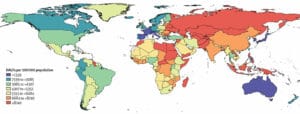An unhealthy diet shortens life more than smoking!
Really?
Indeed, around 11 million deaths worldwide each year are due to unhealthy diets.
Our eating habits do not affect us immediately, but gradually. Therefore, their effects on our health are not as obvious as, for example, poisoning or infectious diseases.
The process is slow but inevitable.
In 2019, The Lancet published a long-term analysis of a study in 195 countries, which found that our daily diet is more harmful to our health than smoking and is associated with one in five deaths.
An unhealthy diet does not shorten our lives directly, but causes small, initially imperceptible changes in our body (high blood pressure, being overweight, bad cholesterol …), Which in turn contributes to the development of non-communicable diseases such as cardiovascular diseases, diabetes, cancer, etc.
So what in our diet is what kills us?
No surprises. We all know this:
- Mēs ēdam pārāk daudz rūpnieciski apstrādātu produktu ar kuriem uzņemam pārāk daudz sāls un cukura;
- We eat too little whole grain products, vegetables, fruits, nuts, seeds…
In the study already mentioned, it was found that every year:
- Three million deaths are due to excessive salt consumption;
- Three million deaths are due to the under-intake of whole grains;
- Two million deaths are due to under-consumption of fruit;
- Too low consumption of nuts, seeds, vegetables, omega-3 (seafood), and low fiber levels were other main reasons.
Respectively, nutrition affects our health in the most significant way.
How does our diet kill us?
About 10 million of the 11 million diet-related deaths were due to cardiovascular disease, with the remainder being cancer and type 2 diabetes.
That is, too much salt:
- Too much salt raises blood pressure, which in turn increases the risk of heart attack and stroke;
- Too much salt can also directly affect the heart and blood vessels, causing heart failure.
Whole grains, fruits and vegetables, on the other hand, have the opposite effect - they are "cardioprotective" and reduce the risk of heart problems.
Optimal nutrition - how far are we?
Globally - very far. About 800 million people worldwide are hungry. At the same time, around 1.9 billion people weigh too much. Both starvation and obesity can lead to diseases that significantly shorten our lives.
Israel, France, Spain, Italy and Japan have the lowest rates of diet-related diseases. In 2017, the United States ranked 43rd, while China ranked 140th. The lowest number of diet-related deaths is in Israel, at 89 per 100,000 inhabitants per year, and the highest in Uzbekistan, at 892 per 100,000 inhabitants per year.
Research shows that nutrition is not ideal in any country, but that countries that generally follow the Mediterranean diet have the lowest number of diet-related deaths.
Read more about the Mediterranean diet HERE.
Number of diet-related deaths (DALYs - Data on disease-specific deaths and disability-adjusted life-years) per 100,000 population in 2017.
Source: pubmed.ncbi.nlm.nih.gov
What do we eat too much and what do we eat too little?
| Recommended (g / day) | The average we consume (g / day) |
Nuts and seeds | 25 | 3 |
Milk | 443 | 71 |
Whole grain products | 126 | 29 |
Red meat | 22 | 27 |
Salt | 3 | 6 |
Source: The Lancet
The situation is made worse by following fad diets such as Keto, Atkins, Dukan, Paleo which significantly limit the intake of carbohydrates and fiber (whole grains, vegetables, nuts, seeds…).
What to do?
Nutritional quality matters regardless of your weight.
The Internet is full of various "Super Effective" diets and weight loss hacks, which, yes - gives short-term results, but eventually the weight returns but health suffers.
The advice is simple - increase the proportion of whole grains, vegetables, fruits, nuts, seeds and dairy products on your diet and reduce the amount of salt.
In practice, this means giving up ultra-processed food (from semi-finished meats to chips, biscuits ...) and cooking at home.
I know it's not easy, but it's worth a try. It is easier to change your eating habits if the changes take place gradually - you start cooking more at home, include more vegetables in your diet, replace high-quality wheat flour products with whole grain products, give up sweetened drinks… And so, step by step, your eating habits become healthier .
But, of course, you always have a choice - to live an active life, eat healthy and live a long life, or eat anything you like, drink alcohol, smoke, do anything that comes to mind and die at the age of 60.
Share this article
Follow me on Facebook
I recommend reading these articles as well

How to maintain weight and slimness
Many of us have lost weight, lost some pounds, and then how to maintain weight and slimness?

Intuitive eating - what is it and are you ready for it?
What is intuitive eating? What are the prerequisites for intuitive eating? Does intuitive eating contribute to weight loss?

Superfoods
What are superfoods? What are superfoods good for? What do they do, and how are they good for our health and well-being?

Microwave ovens and healthy eating
How do a microwave oven and food cooked or heated in it affect our health?


